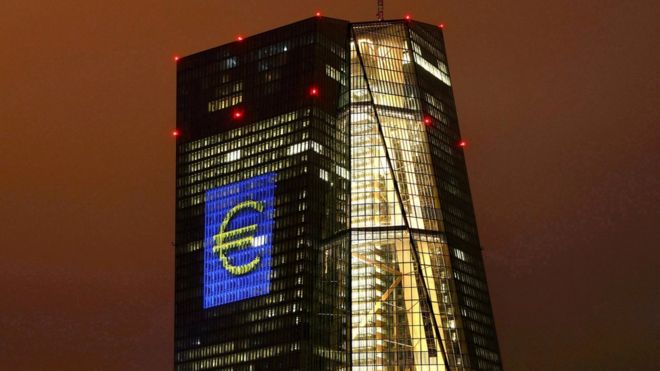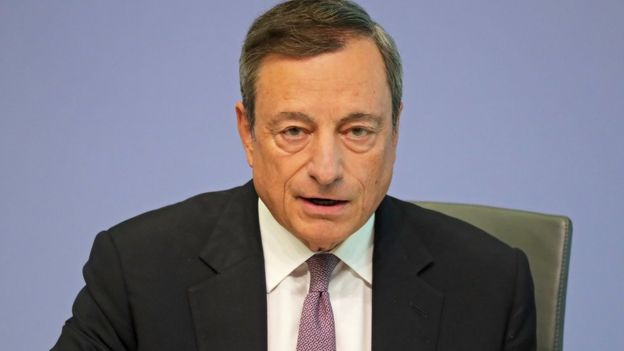 REUTERS
REUTERS
The European Central Bank (ECB) has raised its eurozone economic growth forecast for this year to 2.2%, the fastest growth in 10 years.
ECB president Mario Draghi said the 19-country bloc grew faster than expected in the first half of the year.
It came as the bank kept eurozone interest rates and its bond buying stimulus programme unchanged.
Mr Draghi said the ECB would probably make decisions about its stimulus measures next month.
The ECB is currently buying 60bn euros (£55bn) of bonds a month as part of its quantitative easing (QE) programme.
But analysts expect this to be scaled back in the months ahead given the eurozone's recovery.
Robust growth
The ECB raised its economic growth forecast from 1.9% to 2.2%, which would be the fastest rate since the 3.0% seen in 2007 before the financial crisis started to bite.
"There was a general recognition of the progress made by the eurozone recovery," Mr Draghi said.
"It's robust, it's broad-based, and it was recalled that six million jobs were created since 2013."
However, the bank also cut its forecast for eurozone inflation to 1.2% next year and 1.5% in 2019 - below the ECB's 2% target.
Analysts say this is making the decision on when the bank begins to rein in its stimulus more complicated.
 EPA
EPA
Mr Draghi said "a very substantial degree of monetary accommodation" was still needed to help boost inflation.
He also said the rise in the euro - which has gained 13% in value against the dollar this year - was a source of "uncertainty".
However, his comments were not enough to suppress the euro, which rose 0.8% against the dollar to $1.20. It also increased 0.5% against the pound to almost hit 92 pence.
'Dialled down'
Patrick O'Donnell, an investment manager at Aberdeen Standard Investments, said: "There's no question that the ECB is worried about the euro's appreciation but there's little [Mr Draghi] can actually do about it."
He added the markets widely expected the bank to announce plans in October on winding back QE.
Claus Vistesen, chief eurozone economist at Pantheon Macroeconomics, said: "We think the central bank is trying to send the message that the degree of stimulus will be dialled down as the economy improves, but not removed altogether."
Figures released earlier on Thursday confirmed that the eurozone's economy grew by 0.6% in the three months to June, following growth of 0.5% in the first quarter of the year.
However, despite the pick-up in growth, inflation within the eurozone remains slower than the ECB's target of close to, but below, 2%. Inflation in the bloc was 1.5% in August.
The ECB kept all its main interest rates unchanged, with the benchmark refinancing rate staying at 0%. The deposit facility rate stayed at -0.4%, which means banks pay money to leave their cash at the ECB.
The ECB said it still expected rates to "remain at their present levels for an extended period of time".
No comments:
Post a Comment